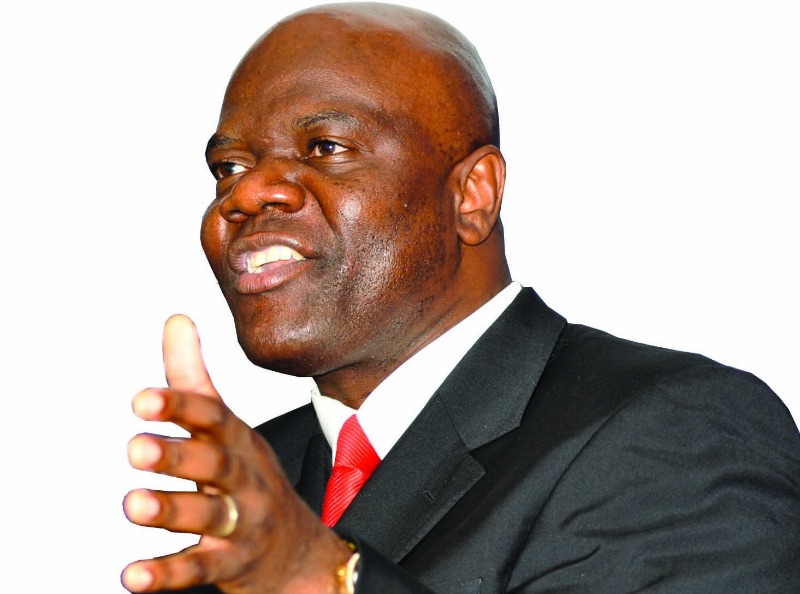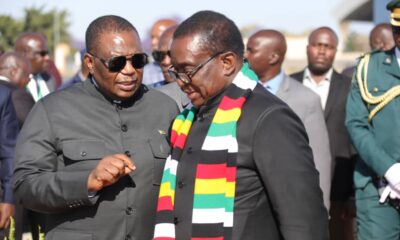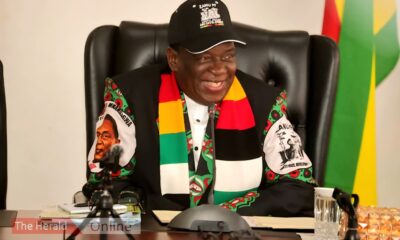
Opinion
An extended excerpt from Professor Arthur Mutambara upcoming book: In Search of the Elusive Zimbabwean Dream: Volume 3
Published
5 years agoon
By
NewsHawksBy Arthur Mutambara
This House would embrace an ever-closer African Union: The case for the opposition
As in 2018, I am back at the University of Oxford on 24 January 2019 to participate in a formal debate in the Oxford Union Debating Chamber. The Oxford Union Society, commonly referred to simply as the Oxford Union, is a debating society in the city of Oxford, England, whose membership is drawn primarily from the University of Oxford. Founded in 1823 and fashioned around the British Westminster parliamentary model, it is the United Kingdom’s most famous university debating society.
It has provided an opportunity for many budding politicians from Britain and other countries to develop their debating skills and acquire a reputation.
For its debate speakers, the Oxford Union attracts political leaders, business icons, public intellectuals, distinguished academics and celebrities from all over the world. The Oxford Union is a truly global platform, where students can hear from world leaders, award-winning musicians, and Nobel Laureates, all under the same roof.
I joined the Oxford Union in 1991 when I came to the University of Oxford as a Rhodes Scholar to pursue graduate studies. I have been a member since then.
It is quite an honour to be invited, twice in a row, as a speaker, in my capacity as the Former Deputy Prime Minister of the Republic of Zimbabwe. The topic is: ‘This House would embrace an ever-closer African Union.’
The African Union is the world’s largest and most ambitious example of regional integration. However, it now finds itself in the geopolitical maelstrom of globalisation, growing Chinese influence and a burgeoning US presence. What should be Africa’s strategic response? What do Africans want? How are their socio-economic and political aspirations best served? Does an ever-closer African Union provide the remedies? This is the context in which this debate is held.
Supporting the motion, is the easier option but the Oxford Union President insists that as a distinguished debater I must take the harder side! I gladly obliged.
Given this invidious task of opposing the motion, I decide to robustly apply my mind and execute the task while upholding my Pan-African disposition. The result is a speech which finds extensive coverage on social media, in the print press in the United Kingdom, South Africa, Zimbabwe and across the continent.
What an outcome from the verbal gymnastics of the Oxford Union. At a cynical level, not only did they give me a side they thought was difficult. They thought by asking me to speak against the AU, they could force me to speak against my convictions! However, I was able to make lemonade out of lemons, and speak in line with my convictions.
In the debate, speakers in proposition of the motion include Omali Yeshitela – Founder of the Uhuru Movement, an African Internationalist organisation which claims the only way for Africans to achieve liberation is to struggle for an all-African socialist government; and Reuben Brigety – an US diplomat who previously served as the US Ambassador to the African Union and Permanent Representative to the United Nations Economic Commission for Africa. With me in opposition to the motion is Carine Kaneza Nantulya – Africa Advocacy Director with the Africa Division at Human Rights Watch, an international NGO that conducts research and advocacy on human rights.
I spoke without any notes. What follows is my transcribed and adapted speech on that auspicious occasion.
Mr President, Sir; here we go again. It feels good to be back in the Oxford Union Debating Chamber, 28 years after my arrival at this great university as a graduate student in 1991. I rise to speak in opposition to the topic that says: ‘This House would embrace an ever-closer African Union.’
Naturally, when I was asked to speak in opposition to this motion, I felt conflicted. The African Union is our African institution – how can I go against it, more so when it is an ever-closer African Union? However, Mr President, Sir; the more I thought about, and reflected on, the issues involved, the ambivalence, equivocation and discomfort disappeared. This motion must be vigorously opposed and rejected. I stand before you in unequivocal and vicious opposition to the proposition that says: ‘This House would embrace an ever-closer African Union.’ I must emphasise that I do so as an avowed, committed and determined Pan-Africanist.
For a start, we need the United States of Africa – a country – and not a union of sovereign states. We need to abolish national sovereignty and embrace continental sovereignty. We must pool our individual national sovereignties into one indivisible and all-inclusive Pan-African sovereignty. In order to leverage Africa’s 1.2 billion people, massive natural resource base and potential US $2.3 trillion GDP we need to operate as one country and not a union of sovereign states. We need one Government, one Head of State and Government, one Legislature and one Judiciary system. China, India and the US are doing just fine with one national leader (President or Prime Minister). We surely do not need 55 Heads of State in Africa. As a minimum, we should have a federation of all the African states with devolved authority but driven by one strong and overarching central government where all sovereignty is reposed, as is the case with the United States. Even more appealing and effective, we must transform the entire continent into a unitary state as is the case with China and India.
An ever-closer AU will deliver neither the federated arrangement nor the unitary entity. You cannot expect the 55 African leaders to commit political suicide and legislate themselves out of existence. Each one of them wants to be a President or Prime Minister even if it means presiding over starving and disempowered people. President Cyril Ramaphosa is not prepared to be a State Governor or Minister of Agriculture of the United States of Africa. President Paul Kagame is not prepared to be a State Governor or a Minister of Home Affairs for the continent. Neither does President Yoweri Museveni want to be reduced to a State Governor or Minister of Transport. They all want to be Presidents of sovereign nations at the expense of the socio-political and economic advancement of ordinary Africans. An ever-closer African Union will continue to accommodate these perverted and delusional ambitions of our African leaders.
Under an ever-closer AU, African leaders and governments pay lip service to continental economic integration and African unity. They have national budgets, visions, strategies, policies, elections, mandates, manifestos and implementation plans. AU programmes such as Agenda 2063 and the AfCFTA (African Continental Free Trade Agreement) are neither referred to nor reflected in these national ambitions, plans and programmes. In fact, Nigeria has not signed the AfCFTA, and South Africa only appended its signature begrudgingly in July 2018, much later than the official date of 21 March 2018. The central organising framework is the individual African state and not the African continent. This is despicable. It is unacceptable.
In that great debate between Kwame Nkrumah and Julius Nyerere in 1963 at the formation of the OAU – on whether to move quickly and unify into the United States of Africa or consolidate African states first and gradually integrate the continent through regional blocs – Nkrumah, a proponent of the former, was right, and Nyerere, an advocate of the latter, was wrong. Gradualism, a brick-by-brick approach, and slowly developing regional blocs towards continental integration have not produced the United States of Africa. The doctrine of an ever-closer union of African states has failed for the past 56 years. Why should this House embrace it?
We need a politically united continent which is economically integrated; characterised by one government, a single market, one passport, a single currency, common foreign policy and one army. We need an arrangement that allows for free movement of people, goods, services and capital throughout the continent, and enables extensive intra-Africa trade while positioning the continent to compete globally as a single economy of 1.2 billion people with a GDP of US $2.3 trillion and a massive natural resource base.
Furthermore, this cohesive and focused African economy – a colossus of immense significance – can then effectively engage, leverage and impact the African Diaspora in pursuit of 21st-century Pan-Africanism driven by economics, business, entrepreneurship and technology.
An ever-closer AU will not deliver any of these grand aspirations. It will not produce the United States of Africa. The Constitutive Act of the AU places primacy on national sovereignty and non-interference in the internal affairs of individual African states.
A key objective of the AU as articulated in Article 3 (b) is to ‘defend the sovereignty, territorial integrity and independence of its Member States’. This is a clear and explicit constitutional and structural constraint for the AU. In order to achieve the United States of Africa the only sovereignty and territorial integrity that should be respected and upheld is that of the entire continent as a single entity, and not that of the individual, fragmented and dysfunctional nation states.
The issues of democracy, human rights violations, poverty eradication and shared economic prosperity can be best addressed centrally by a strong continental Unitary Government or Federal Government. In this arrangement, there is potential to unlock enormous economic value within the continent, while effectively leveraging global relationships.
Commercial negotiations and business deals with countries such as China, India and the United States are best dealt with collectively as one African entity characterised by a massive natural resource base, 1.2 billion people and a US $2.3 trillion GDP; not through bilateral deals between individual African countries and the external players. In the latter approach, we get short-changed. In fact, the big economies – the United States, China, India, Russia and the European Union – would want us to remain fragmented and disunited. It serves their geopolitical and economic interests.
They extract more financial value and competitive advantage from our divisions, strategic incoherence and lack of scale. A superfluous and ill-defined ever-closer, but still fragmented, AU is what they would want us to pursue. It would be business as usual as they would continue to exploit our lack of cohesion, focus, unity and economic integration.
This is the case even though these big global economies understand and cherish the value of a united and focused large population, an extensive consolidated resource base, and economies of scale. It is prudent to note that the greatest war that the US citizens ever fought was to keep the United States together – the American Civil War. More US citizens died during that war than were killed in both the First and Second World Wars.
Citizens of the United States bled and sacrificed to achieve the United States of America. Obviously, the people California would have loved to have had their own President, have a seat in the United Nations and be the fourth largest economy in the world. The states of New York and Georgia could have had similar aspirations.
All those ambitions were sacrificed in pursuit of one country – the United States – the biggest economy on Earth (with a population of 325 million people and a US $19 trillion GDP), the only superpower in the world, and the richest nation in the history of humanity. The Chinese revolution produced a huge unitary state – modern China – which has since reincorporated Hong Kong and is pursuing Taiwan under the ‘One China’ policy.
The Indians cherish India as a massive unitary state – the world’s largest democracy. In fact, Gandhi’s vision was that of India and Pakistan as one country. Despite the inconsequential noises about Brexit, by and large the Europeans are committed to the EU, and the EU is a much more serious and better-managed institution than the AU.
The African Union, formed on 9 July 2002 to replace the OAU, is poorly funded by its Member States – the African countries. Over 70 per cent of its budget comes from donors, 75 per cent of its operations are funded by the UN. Its secretariat is manned by fewer than 800 people – who are not chosen on merit – to integrate a continent of 1.2 billion people. This is in contrast to 33 000 technocrats who work for the European Union (EU) within the framework of strong and empowered institutions. All AU decisions are made by the Heads of State who meet a few times a year. Currently, intra-Africa trade – trade among African countries – is the lowest of all global regions at 12 per cent, as compared to 54 per cent in the North America Free Trade Area (NAFTA), 70 per cent within the EU and 60 per cent in Asia.
The AU is characterised by chronic implementation failure, obscure relevance to the ordinary African, pervasive underperformance, limited administrative and organisational capacity, poor governance and accountability, and a lack of alignment and synergy-unlocking between the AU and regional economic blocs.
Put simply and bluntly, the AU is not working. It is dysfunctional. It must be dismantled and replaced by a new body designed to achieve the United States of Africa. The Kagame Report on AU Reforms – while correctly identifying some of these ills of the institution, its recommendations on the way forward are highly inadequate and grossly incompetent. They must be dismissed with the contempt they deserve.
The predecessor to the AU, the OAU, achieved the liberation of all African countries by 1994. This is acknowledged and greatly appreciated. However, the next stage in our African struggle – shared economic prosperity and sustained economic growth – demand the demise of African national sovereignty.
This sovereignty has been abused by corrupt, unimaginative, unstrategic, undemocratic and kleptocratic African leaders; sometimes reducing the AU (and its predecessor the OAU) to a dictators’ club. Just recently the impotence and ineffectiveness of the AU were demonstrated by its inaction and lack of leadership in Zimbabwe, the DRC, Gabon and Burundi. Historically the ineptitude in Rwanda, Somalia and Libya does not help the AU case.
The boundaries between African states are artificial and meaningless – thanks to the Berlin conference of 1884. They are a source of conflict and split people of the same culture and ethnicity. Moreover, they inhibit and frustrate economic progress, for example, trade-facilitating infrastructure development across borders.
The AU is ostensibly a union of African governments – a union of political leaders. We need a union of ordinary African people – the citizens. Civil society, academics, women, students, farmers, businesspeople, workers, currently do not shape or drive the AU agenda. Structurally, an ever-closer AU cannot address this dysfunction. Why should we embrace such a union?
While an ever-closer AU is a noble idea, it is not good enough. Sometimes the enemy of the best is the good. Pursuing an ever-closer AU is an impediment to, and a distraction from, our glorious ambition of the United States of Africa.
We must jump from the pan into the fire. We must take the plunge and pursue the United States of Africa. Of course, in the arduous journey towards this ambitious dream, there will be the inevitable challenges. These include the different languages and cultures across the continent, ethnic diversity, the vast geography, four time zones, various systems and standards, colonial legacy-inflicted divisions (Anglophone, Francophone, Lusophone and Arabic), religious differences, and uneven levels of economic development and industrialisation.
However, these obstacles are not insurmountable. They can be efficaciously tackled and resolved. We just need vision, leadership, strategy and effective execution; all rooted in continent-wide buy-in and ownership of the agenda. This must be fortified, enhanced and buttressed by a Pan-African attitude that embraces and leverages the entire African Diaspora. With this approach and framework, we shall overcome.
Yes, the United States of Africa looks overly ambitious, if not impossible. It is precisely for this reason that we should aspire towards it. As SA President Nelson Mandela taught us: ‘It always seems impossible until it is done.’
To paraphrase US President John F. Kennedy: ‘We must pursue this agenda not because it is easy, but because it is hard.’ Once upon a time, slavery looked intractable, colonialism appeared unchallengeable, while fighting apartheid seemed an insurmountable task. A feasibility study or SWOT (strengths, weaknesses, opportunities and threats) analysis will not have sanctioned or endorsed the struggles against slavery, colonialism or apartheid. We must unshackle ourselves from paralysis by analysis. No guts, no glory.
As Africans, we reject an ever-closer AU and embrace the United States of Africa. Such a framework will enable us to advance our socio-political and economic aspirations across the continent dramatically. Furthermore, we will be able to engage with, and unlock value from, the wider world as one massive and cohesive entity and not as a union of fragmented and non-viable sovereign nation states.
Mr President, Sir; an ever-closer African Union is a dummy. You are selling Africans a dummy. We viciously reject this dummy. It is half a loaf. Africans want the full loaf – the United States of Africa.
This House must not embrace an ever-closer African Union.
I thank you.
You may like




















